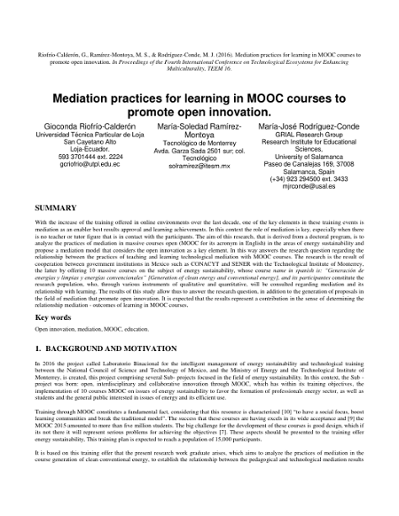| dc.contributor.author | Riofrío Calderón, Gioconda | en |
| dc.contributor.author | Ramírez Montoya, María S. | en |
| dc.contributor.author | Rodríguez Conde, María José | en |
| dc.date.accessioned | 2016-10-08T21:03:50Z | |
| dc.date.available | 2016-10-08T21:03:50Z | |
| dc.date.issued | 2016 | |
| dc.identifier.uri | http://hdl.handle.net/11285/620896 | |
| dc.description.abstract | With the increase of the training offered in online environments over the last decade, one of the key elements in these training events is mediation as an enabler best results approval and learning achievements. In this context the role of mediation is key, especially when there is no teacher or tutor figure that is in contact with the participants. The aim of this research, that is derived from a doctoral program, is to analyze the practices of mediation in massive courses open (MOOC for its acronym in English) in the areas of energy sustainability and propose a mediation model that considers the open innovation as a key element. In this way answers the research question regarding the relationship between the practices of teaching and learning technological mediation with MOOC courses. The research is the result of cooperation between government institutions in Mexico such as CONACYT and SENER with the Technological Institute of Monterrey, the latter by offering 10 massive courses on the subject of energy sustainability, whose course name in spanish is: “Generación de energías y limpias y energías convencionales” [Generation of clean energy and conventional energy], and its participantes constitute the research population, who, through various instruments of qualitative and quantitative, will be consulted regarding mediation and its relationship with learning. The results of this study allow thus to answer the research question, in addition to the generation of proposals in the field of mediation that promote open innovation. It is expected that the results represent a contribution in the sense of determining the relationship mediation - outcomes of learning in MOOC courses. | |
| dc.format | En Extenso / In Extenso | en |
| dc.language.iso | eng | en |
| dc.relation | 266632-CONACYT-SENER-S0019201401 | en |
| dc.relation.ispartof | https://repositorio.itesm.mx/handle/11285/628013 | en_US |
| dc.relation.url | https://2016.teemconference.eu/ | en |
| dc.rights.uri | http://creativecommons.org/licenses/by-nc-nd/4.0/ | * |
| dc.title | Mediation practices for learning in MOOC courses to promote open innovation. | en |
| dc.type | Artículo de Conferencia / Conference Article | |
| dc.conference.name | Fourth International Conference on Technological Ecosystems for Enhancing Multiculturality, TEEM 2016 | en |
| dc.conference.host | Universidad de Salamanca | en |
| dc.conference.location | Salamanca, Spain | en |
| dc.subject.keyword | Open Innovation | en |
| dc.subject.keyword | Mediation | en |
| dc.subject.keyword | MOOC | en |
| dc.subject.keyword | Education | en |
| dc.identifier.volume | 2016 | en |
| dc.contributor.affiliation | Tecnologico de Monterrey | en |
| dc.subject.discipline | Ciencias Sociales / Social Sciences | |
| refterms.dateFOA | 2016-12-01T00:00:00Z | |
| html.description.abstract | <div style="text-align: justify;">With the increase of the training offered in online environments</div>
<div style="text-align: justify;">over the last decade, one of the key elements in these training</div>
<div style="text-align: justify;">events is mediation as an enabler best results approval and</div>
<div style="text-align: justify;">learning achievements. In this context the role of mediation is</div>
<div style="text-align: justify;">key, especially when there is no teacher or tutor figure that is in</div>
<div style="text-align: justify;">contact with the participants. The aim of this research, that is</div>
<div style="text-align: justify;">derived from a doctoral program, is to analyze the practices of</div>
<div style="text-align: justify;">mediation in massive courses open (MOOC for its acronym in</div>
<div style="text-align: justify;">English) in the areas of energy sustainability and propose a</div>
<div style="text-align: justify;">mediation model that considers the open innovation as a key</div>
<div style="text-align: justify;">element. In this way answers the research question regarding the</div>
<div style="text-align: justify;">relationship between the practices of teaching and learning</div>
<div style="text-align: justify;">technological mediation with MOOC courses. The research is</div>
<div style="text-align: justify;">the result of cooperation between government institutions in</div>
<div style="text-align: justify;">Mexico such as CONACYT and SENER with the Technological</div>
<div style="text-align: justify;">Institute of Monterrey, the latter by offering 10 massive courses</div>
<div style="text-align: justify;">on the subject of energy sustainability, whose course name in</div>
<div style="text-align: justify;">spanish is: “Generación de energías y limpias y energías</div>
<div style="text-align: justify;">convencionales” [Generation of clean energy and conventional</div>
<div style="text-align: justify;">energy], and its participantes constitute the research population,</div>
<div style="text-align: justify;">who, through various instruments of qualitative and quantitative,</div>
<div style="text-align: justify;">will be consulted regarding mediation and its relationship with</div>
<div style="text-align: justify;">learning. The results of this study allow thus to answer the</div>
<div style="text-align: justify;">research question, in addition to the generation of proposals in</div>
<div style="text-align: justify;">the field of mediation that promote open innovation. It is</div>
<div style="text-align: justify;">expected that the results represent a contribution in the sense of</div>
<div style="text-align: justify;">determining the relationship mediation - outcomes of learning in MOOC courses.</div> | |

